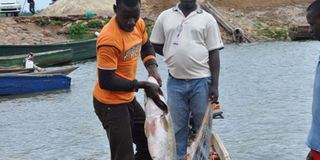Include value of lakes, forests in GDP figures, UN tells Uganda

Fishermen collect their catch at Ggaba Landing Site on Lake Victoria. The lake is a source of livelihood for about millions of people in the region. PHOTO BY ERONIE KAMUKAMA
What you need to know:
Important. About 30 million people derive livelihood from Lake Victoria.
ENTEBBE. Government should include the economic value of vital resources such as Lake Victoria in the calculation of the country’s Gross Domestic Product (GDP) to provide a stimulus for renewed conservation, a senior United Nations official has said.
Ms Adriana Dinu, the United Nations Development Programme (UNDP) Global Environment Facility executive coordinator, said overlooking the monetary contribution of the assets such as; lakes, animals and plant cover leads to less value being attached to them and hence their degradations.
“Look at Lake Victoria which is the largest lake in Africa. What is its value? Studies show Lake Victoria is providing some of the most productive fresh water fisheries worldwide, with 500,000 tonnes of fish and $400m dollars in revenue,” Ms Dinu said.
“This is the wealth. How come this wealth that is considered free is not factored in the calculation of GDP? The consequences are biodiversity loss we are facing today; water insecurity, the food insecurity…”
“We cannot continue not counting what counts” she added.
Ms Dinu was last week speaking at the third Africa regional Biodiversity Conference in Entebbe.
The forum aims at finding finance solutions to the conservation of plant and animal species under threat of extinction and whose habitats have also been adversely been degraded.
Lake Victoria is facing unprecedented pollution from industries, hotels and silting due to agricultural activity and practices such as sand mining and deforestation. This pollution, over fishing and other factors combined, have resulted into dwindling fish stocks. The ministry of Agriculture, Animal Industry and Fisheries figures show that Uganda has lost more than one million jobs due to the dwindling fish stocks.
Already, according to available data as of last year, more than 10 fish processing factories have closed due to lack of supplies.
Lake Victoria is shared by three East African countries of Uganda, Kenya and Tanzania but Rwanda and Burundi benefit from its catchment area. The lake is also a source of; water, sand and cultural benefits among others uses.
Source of livelihood
It is estimated that more than 30 million people in the region depend on the lake for their livelihood.
Earlier this year, Mr Paul Okware, the ministry’s commissioner for operations on Lake Victoria, said the country is losing a lot to illegal fishing where unauthorised nets, among others, are being used on the lake to catch undersize fish.
Efforts such as the deployment of military to curb the said ills, he said are being enforced and yielding positive results.
Ms Dinu also used the value of the endangered elephants and the Rhinos to further illustrate her point.
She said a live elephant is worth $1.6m in ecotourism opportunities yet the cost of poaching leads to a $50b loss in annual growth to African countries. “Can we keep on not counting what counts in economic growth for African countries?” she asked.




